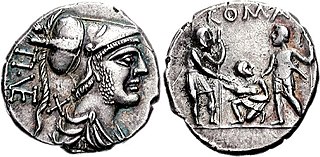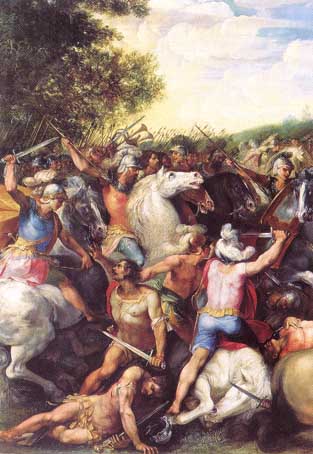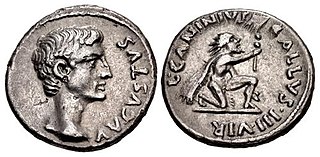Related Research Articles
The gens Gabinia was a plebeian family at ancient Rome. Members of this gens first appear in the second century BC. The nomen derives from the city of Gabii, east of Rome.

The gens Mamilia was a plebeian family at ancient Rome during the period of the Republic. The gens was originally one of the most distinguished families of Tusculum, and indeed in the whole of Latium. It is first mentioned in the time of the Tarquins; and it was to a member of this family, Octavius Mamilius, that Lucius Tarquinius Superbus, the seventh and last King of Rome, betrothed his daughter. The gens obtained Roman citizenship in the 5th century BC, and some of its members must subsequently have settled at Rome, where Lucius Mamilius Vitulus became the first of the family to hold the consulship in 265 BC, the year before the First Punic War.
The gens Papiria was a patrician family at ancient Rome. According to tradition, the Papirii had already achieved prominence in the time of the kings, and the first Rex Sacrorum and Pontifex Maximus of the Republic were members of this gens. Lucius Papirius Mugillanus was the first of the Papirii to obtain the consulship in 444 BC. The patrician members of the family regularly occupied the highest offices of the Roman state down to the time of the Punic Wars. Their most famous member was Lucius Papirius Cursor, five times consul between 326 and 313 BC, who earned three triumphs during the Samnite Wars. Most of the Papirii who held office under the later Republic belonged to various plebeian branches of the family. Although the most illustrious Papirii flourished in the time of the Republic, a number of the family continued to hold high office during the first two centuries of the Empire.

The gens Aquillia or Aquilia was a plebeian family of great antiquity at ancient Rome. Two of the Aquillii are mentioned among the Roman nobles who conspired to bring back the Tarquins, and a member of the house, Gaius Aquillius Tuscus, was consul in 487 BC.

The gens Quinctia, sometimes written Quintia, was a patrician family at ancient Rome. Throughout the history of the Republic, its members often held the highest offices of the state, and it produced some men of importance even during the imperial period. For the first forty years after the expulsion of the kings the Quinctii are not mentioned, and the first of the gens who obtained the consulship was Titus Quinctius Capitolinus Barbatus in 471 BC; but from that year their name constantly appears in the Fasti consulares.

The Julii Caesares were the most illustrious family of the patrician gens Julia. The family first appears in history during the Second Punic War, when Sextus Julius Caesar was praetor in Sicily. His son, Sextus Julius Caesar, obtained the consulship in 157 BC; but the most famous descendant of this stirps is Gaius Julius Caesar, a general who conquered Gaul and became the undisputed master of Rome following the Civil War. Having been granted dictatorial power by the Roman Senate and instituting a number of political and social reforms, he was assassinated in 44 BC. After overcoming several rivals, Caesar's adopted son and heir, Gaius Julius Caesar Octavianus, was proclaimed Augustus by the senate, inaugurating what became the Julio-Claudian line of Roman emperors.
The gens Aelia, occasionally written Ailia, was a plebeian family in Rome, which flourished from the fifth century BC until at least the third century AD, a period of nearly eight hundred years. The archaic spelling Ailia is found on coins, but must not be confused with Allia, which is a distinct gens. The first member of the family to obtain the consulship was Publius Aelius Paetus in 337 BC.
The gens Albinia was a plebeian family at Rome during the early centuries of the Republic. The first member of this gens to achieve prominence was Lucius Albinius Paterculus, one of the first men to hold the office of tribune of the plebs, after it was created in 494 BC.
The gens Atia, sometimes written Attia, was a plebeian family at Rome. The first of the gens to achieve prominence was Lucius Atius, a military tribune in 178 BC. Several of the Atii served in the Civil War between Caesar and Pompeius. The gens Attia may be identical with this family, although the individuals known by that name lived nearly a century after the more notable Atii, and are not known to have been related.

The gens Veturia, originally Vetusia, was an ancient patrician family of the Roman Republic. According to tradition, the armourer Mamurius Veturius lived in the time of Numa Pompilius, and made the sacred ancilia. The Veturii occur regularly in the Fasti Consulares of the early Republic, with Gaius Veturius Geminus Cicurinus holding the consulship in 499 BC. Like other old patrician gentes, the Veturii also developed plebeian branches. The family declined in the later Republic, with the last consular Veturius holding office in 206 BC, during the Second Punic War.
The gens Caesennia was an Etruscan family from Tarquinii during the late Roman Republic and in imperial times. Two of its members were mentioned by Cicero, and the name is found in sepulchral inscriptions.

The gens Hostilia was an ancient family at Rome, which traced its origin to the time of Romulus. The most famous member of the gens was Tullus Hostilius, the third King of Rome; however, all of the Hostilii known from the time of the Republic were plebeians. Several of the Hostilii were distinguished during the Punic Wars. The first of the family to obtain the consulship was Aulus Hostilius Mancinus in 170 BC.

The gens Horatia was a patrician family at ancient Rome. In legend, the gens dates back to the time of Tullus Hostilius, the third King of Rome. One of its members, Marcus Horatius Pulvillus, was consul suffectus in 509 BC, the first year of the Republic, and again in 507. The most famous of the Horatii was his nephew, Publius Horatius Cocles, who held the Sublician bridge against the army of Lars Porsena circa 508 BC.

The gens Caninia was a plebeian family at ancient Rome during the later Republic. The first member of the gens who obtained any of the curule offices was Gaius Caninius Rebilus, praetor in 171 BC; but the first Caninius who was consul was his namesake, Gaius Caninius Rebilus, in 45 BC.
The gens Sextia was a plebeian family at ancient Rome, from the time of the early Republic and continuing into imperial times. The most famous member of the gens was Lucius Sextius Lateranus, who as tribune of the plebs from 376 to 367 BC, prevented the election of the annual magistrates, until the passage of the lex Licinia Sextia, otherwise known as the "Licinian Rogations," in the latter year. This law, brought forward by Sextius and his colleague, Gaius Licinius Calvus, opened the consulship to the plebeians, and in the following year Sextius was elected the first plebeian consul. Despite the antiquity of the family, only one other member obtained the consulship during the time of the Republic. Their name occurs more often in the consular fasti under the Empire.
The gens Sextilia was a plebeian family at ancient Rome. The first member of this gens to achieve prominence was Gaius Sextilius, consular tribune in 379 BC. None of the family obtained the consulship, but they endured throughout Roman history from the early Republic into imperial times.
The gens Cincia was a plebeian family at Rome. The first member of the gens to achieve prominence was Lucius Cincius Alimentus, who was elected praetor in 209 BC.
The gens Manilia was a plebeian family at ancient Rome. Members of this gens are frequently confused with the Manlii, Mallii, and Mamilii. Several of the Manilii were distinguished in the service of the Republic, with Manius Manilius obtaining the consulship in 149 BC; but the family itself remained small and relatively unimportant.
The gens Papia was a plebeian family at ancient Rome. Members of this gens are first mentioned at the time of the Samnite Wars, but do not appear at Rome until the final century of the Republic. Marcus Papius Mutilus was the only member of the family to attain the consulship, which he held in AD 9.
The gens Titinia was a minor plebeian family at ancient Rome. Members of this gens are mentioned as early as the time of the decemvirs, but only a few held any magistracies, and none of them ever attained the consulship.
References
- ↑ Dictionary of Greek and Roman Biography and Mythology , William Smith, Editor.
- ↑ Appianus, Bellum Civile i. 32, 33.
- ↑ Valerius Maximus, Factorum ac Dictorum Memorabilium libri IX iii. 2. § 18.
- ↑ Marcus Tullius Cicero, Pro Sestio 47, Pro Gaio Rabirio Postumo 7.
- ↑ CIL I, 1945
- ↑ D. R. Shackleton Bailey, Two Studies in Roman Nomenclature (1976), pp. 85, 92, 115–116
![]() This article incorporates text from a publication now in the public domain : Smith, William, ed. (1870). Dictionary of Greek and Roman Biography and Mythology .
This article incorporates text from a publication now in the public domain : Smith, William, ed. (1870). Dictionary of Greek and Roman Biography and Mythology .{{cite encyclopedia}}: Missing or empty |title= (help)